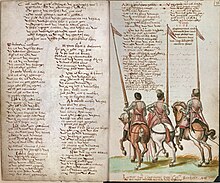Het Wilhelmus
| English: William | |
|---|---|

Early version of the Wilhelmus as preserved in a manuscript from 1617
|
|
|
National anthem of |
|
| Lyrics | disputed, 1568 ~ 1572 |
| Music | adapted by Adrianus Valerius, composer of original unknown, 1568 |
| Adopted | 1932 (officially) 1954 (Netherlands Antilles) |
| Relinquished | 1964 (Netherlands Antilles) |
| Music sample | |
|
|
|
Wilhelmus van Nassouwe, usually known just as the Wilhelmus (Dutch: Het Wilhelmus; pronounced [ɦɛt ʋɪlˈɦɛlmɵs]; English translation: the William), is the national anthem of the Kingdom of the Netherlands and the oldest known national anthem in the world. The national anthem of Japan, Kimigayo, has the oldest lyrics, dating from the 9th century. However, a melody was only added in the late 19th century, making it a poem rather than an anthem for most of its lifespan. Although the Wilhelmus was not recognised as the official national anthem until 1932, it has always been popular with parts of the Dutch population and resurfaced on several occasions in the course of Dutch history before gaining its present status. It was also the anthem of the Netherlands Antilles from 1954–1964.
Like many anthems, the Wilhelmus originated in the nation's struggle to achieve independence. It tells of the Father of the Nation William of Orange who was stadholder in the Netherlands under the king of Spain. In the first person, as if quoting himself, William speaks to the Dutch people ("mijn ondersaten", my subjects) and tells about both the outer conflict – the Dutch Revolt – as well as his own, inner struggle: on one hand, he tries to be faithful to the king of Spain, on the other hand he is above all faithful to his conscience: to serve God and the Dutch people. This is made apparent in the 8th stanza where the comparison is made between the biblical David who serves under the tyrannic king Saul, and William who serves under the King of Spain. As the merciful David defeats the unjust Saul and is rewarded by God with the kingdom of Israel, so too, with the help of God, will William be rewarded a kingdom; being either or both the Netherlands, and the kingdom of God.
...
Wikipedia
